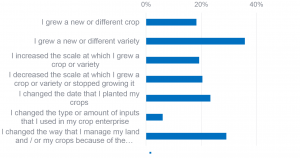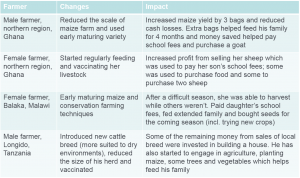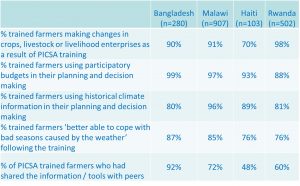Monitoring and Evaluation Approach
Evaluating the impact of PICSA for farmers is vital both to understand how well the approach works, and to learn from experience. We have therefore developed a methodology for monitoring and evaluation of PICSA, which has been used in several countries. This includes:
- Monitoring by Field Staff – During implementation, field staff record:
- The number of farmers (Male and Female) who attend each session.
- The training and activities covered with farmers.
- Observations about what the farmers found useful, challenging, interesting, or irrelevant.
- Details of whether and how information about PICSA was shared outside the session.
- Planning and Review Meetings – Field staff and PICSA experts meet to discuss the successes and challenges they have faced in PICSA implementation, as well as possible solutions.
- Quantitative Survey – Independent enumerators conduct a survey with randomly sampled farmers. This happens several months after growing season in which PICSA was implemented, which allows time for farmers to implement their selected crop, livestock and livelihood options.
- Qualitative Case Studies – Researchers use open-ended questions and participatory activities to build a more detailed understanding of the effects PICSA has for farmers. Participants are selected from the subset of farmers who said they had made changes in the survey.
Results from Monitoring and Evaluation
Previous evaluations have indicated that PICSA has been successful in the countries where it has been implemented at scale, as shown below:
Large numbers of farmers are clearly making changes to their practices following PICSA training. Some examples of these changes include growing a new crop variety, changing land management practices, or starting a business. A clear example of this is shown in Northern Ghana, where 97% of farmers made changes as follows:

These changes often have a positive impact on farmers’ lives, which is shown by these examples from the qualitative case studies:

Find out more about the impact of PICSA on our PICSA in Practice page.

